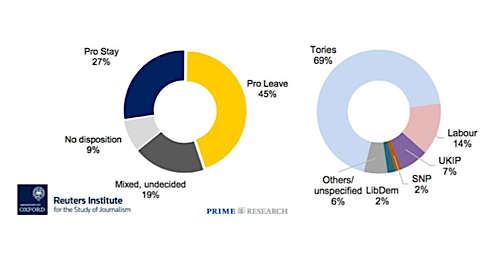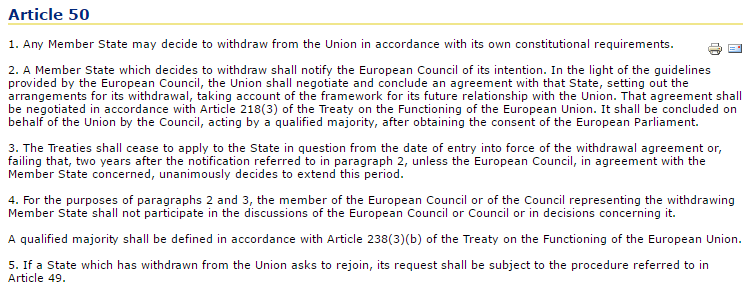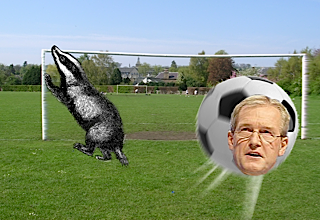
As the crucial UK vote on staying in or leave the EU edges closer, UK resident and ARC2020 columnist Peter Crosskey makes some observations about Brexit, agri-food, media bias and – importantly – Article 50 of the Lisbon Treaty.
Brexiteers in the UK are having a field day in the limelight, shadow-boxing with half-truths and spin that shows signs of being made up as they go along. The Brexit circus has enjoyed a media feeding frenzy and reporters have been fed more sound bites than facts. A study carried out by the Reuters Institute that found 45% of the UK’s mainstream media coverage during the first two months of the campaign was pro-Brexit, 27% backed staying and 20% was neutral.
The EU-bashing movement has backers with suspiciously deep pockets. They have not hesitated to splash out on large ticket items such as the professionally made hour-long online film Brexit – The Movie.
To save time and bandwidth, there is a two minute trailer on these Brexiteers’ view of European agriculture. Viewers should be aware that this short clip relies heavily on racist stereotypes and passes off 30-year-old newsreel footage of a fruit mountain as a persisting feature of the current CAP.
How such willful distortions come to be peddled as fact is a sad reflection on the appetite for populist demagogues in the UK. Towards the end of Brexit – The Movie is a series of clips featuring Kelvin MacKenzie, a former editor of Murdoch’s flagship tabloid The Sun in the Thatcher years. An unrepentant xenophobe, MacKenzie trashes the vision of Europe as a continent with a future. Instead, he ridicules foreign languages and cultures as an irrelevance to working people. The referendum, he gloats, is an opportunity for ordinary people to take “revenge” on a broader view of the world. He sticks his tongue out and makes a loud farting noise at the camera, knowing that his insensitive jingoistic journalism has made him far richer than many of those he so deeply despises.
The Article 50 time bomb
Across the board, from the BBC outwards, UK media coverage of the Brexit debate has been flawed by a major factual omission in describing the Brexit scenario, which presupposes a UK presence at Brexit negotiations. The probable outcome is that the UK would have to accept whatever terms the remaining 27 member states see fit to offer.
In the event of a UK vote to leave Europe, the government of the day would launch the formal process by invoking Article 50 of the consolidated version of the Treaty on European Union.
Paragraph one reads: “1. Any Member State may decide to withdraw from the Union in accordance with its own constitutional requirements.” From a Brexiteer’s viewpoint, so far, so good.
Paragraphs two and three set out the mechanisms and timetable by which such a withdrawal would be decided. Here is a key passage from paragraph two: “…the Union shall negotiate and conclude an agreement with that State, setting out the arrangements for its withdrawal, taking account of the framework for its future relationship with the Union.”
Paragraph four is a game changer that destroys any semblance of the UK’s self-determination in this process:
“4. For the purposes of paragraphs 2 and 3, the member of the European Council or of the Council representing the withdrawing Member State shall not participate in the discussions of the European Council or Council or in decisions concerning it.”
Once paragraph four is taken into account, there is no a carefully-managed role for the UK government to play in discussing the terms of the settlement that will be negotiated by the 27 remaining members of the European Union. Within a two-year window the UK will have to accept whatever is handed down by the remaining member states, which will take into account: “…the framework for its future relationship with the Union.”
This is neither a new nor an original interpretation of Article 50:
- Alan Renwick of University College London’s Constitution Unit covers article 50 in some detail;
- Dr Giacomo Benedetto of the Centre for European Politics discussed Article 50 on January 3, 2016;
- Agata Gostyńska-Jakubowska of the Centre for European Reform wrote about the Seven Blunders: Why Brexit would be harder than Brexiters think on April 28 and
- December 2015, Bronwen Maddox described Article 50 as “an EU referendum horror” in Prospect Magazine.
There is still time to inform and rebalance the referendum debate with a dose of fact rather than the bluff and bravado that is wheeled out by Brexiteers when faced with awkward truths. Paragraph four of Article 50 deserves to be heard more clearly and by a wider public.






